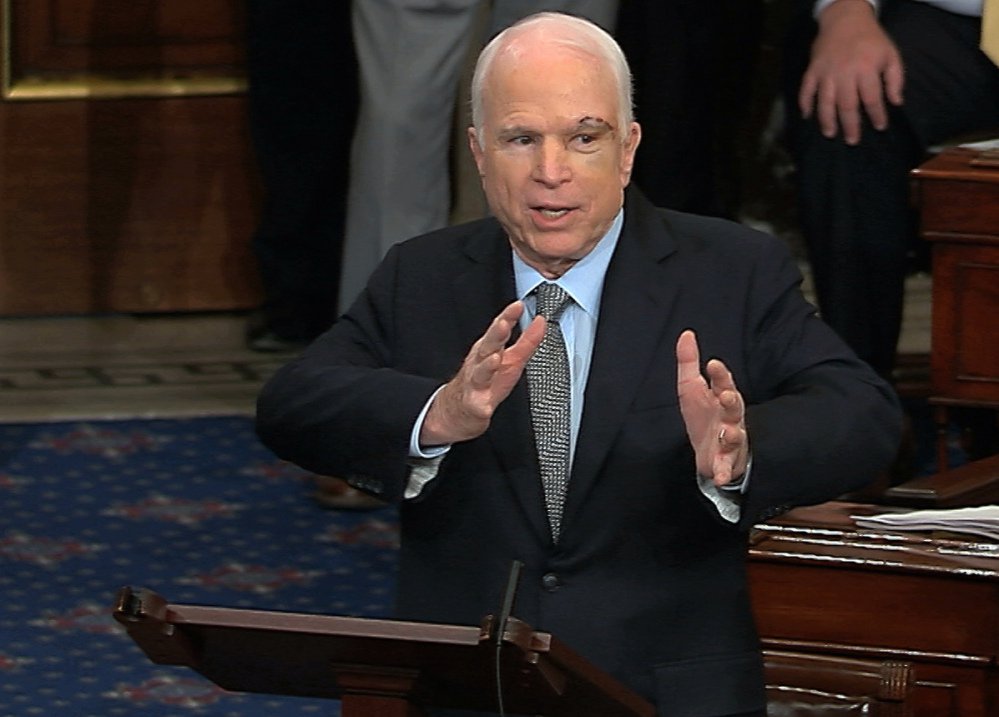WASHINGTON — John McCain, maverick of the Senate, did not return to Capitol Hill and suddenly stop the progress of the Republican health-care effort.
But the Arizona Republican, now battling an aggressive form of brain cancer, did use his moment in the spotlight Tuesday to deliver a sobering message to colleagues.
The Senate might be known as the world’s greatest deliberative body, McCain said, but it’s not clear it deserves that reputation today. The partisanship, the gridlock and the political subterfuge have dragged down the institution, he said.
Senators’ work is “more partisan, more tribal more of the time than any other time I remember,” McCain told a rapt audience on the Senate floor. “Our deliberations can still be important and useful, but I think we’d all agree they haven’t been overburdened by greatness lately. And right now, they aren’t producing much for the American people.”
McCain’s delivered a speech after casting a vote in favor of beginning debate on the Republican health-care bill. But while his vote was critical to the success of that motion – Tuesday’s vote split the Senate 50-50, with Vice President Mike Pence breaking the tie in favor of starting debate – McCain criticized Republican leaders for their lack of transparency and suggested the health-care effort might not ultimately succeed.
“We’ve tried to amend the Affordable Care Act by coming up with a proposal behind closed doors in consultation with the administration, then springing it on skeptical members, trying to convince them it’s better than nothing, asking us to swallow our doubts and force it past a unified opposition. I don’t think that’s going to work in the end, and it probably shouldn’t,” McCain said. “Let’s trust each other. Let’s return to regular order. We’ve been spinning our wheels on too many important issues because we keep trying to find a way to win without help from across the aisle. That’s an approach that’s been employed by both sides, mandating legislation from the top down, without any support from the other side, with all the parliamentary maneuvers that requires.”
McCain’s condition had become the latest reminder of the delicate Republican health-care effort, with questions swirling over the last 11 days about whether his absence would imperil future votes. The senator, 80, was in Phoenix recovering from blood-clot removal surgery and considering options for treatment when he announced he would come back to Capitol Hill on Tuesday, a sign to Republican leaders they might actually be able to make progress on health care this week.
The diagnosis also raised some uncomfortable questions for Republican senators about their health-care proposals, some of which would make dramatic cuts to Medicaid and result in fewer people overall with health insurance. McCain is receiving medical care at the highly regarded Mayo Clinic in Phoenix, and unlike many average Americans, he is at no risk of losing his coverage or his ability to receive treatment under the Republican bills.
McCain arrived at the U.S. Capitol around 3 p.m. with his wife, Cindy, and boarded an elevator to the second floor. Escorted by a Senate usher and police officers, he flashed a tight smile at reporters awaiting him and walked toward the chamber. Asked how he was feeling, he shook his hands in a so-so gesture, then gave a thumbs-up.
As they do for every senator, high school-age pages opened the Senate chamber’s doors, and McCain walked through. But unlike what they do for every other senator, his colleagues turned in his direction and broke into applause.
McCain entered to a rousing ovation. Despite the hyperpartisan nature of the legislation, McCain provided a cathartic moment for the chamber. One by one almost every senator lined up to shake his hand and welcome him back.
Send questions/comments to the editors.



Success. Please wait for the page to reload. If the page does not reload within 5 seconds, please refresh the page.
Enter your email and password to access comments.
Hi, to comment on stories you must . This profile is in addition to your subscription and website login.
Already have a commenting profile? .
Invalid username/password.
Please check your email to confirm and complete your registration.
Only subscribers are eligible to post comments. Please subscribe or login first for digital access. Here’s why.
Use the form below to reset your password. When you've submitted your account email, we will send an email with a reset code.